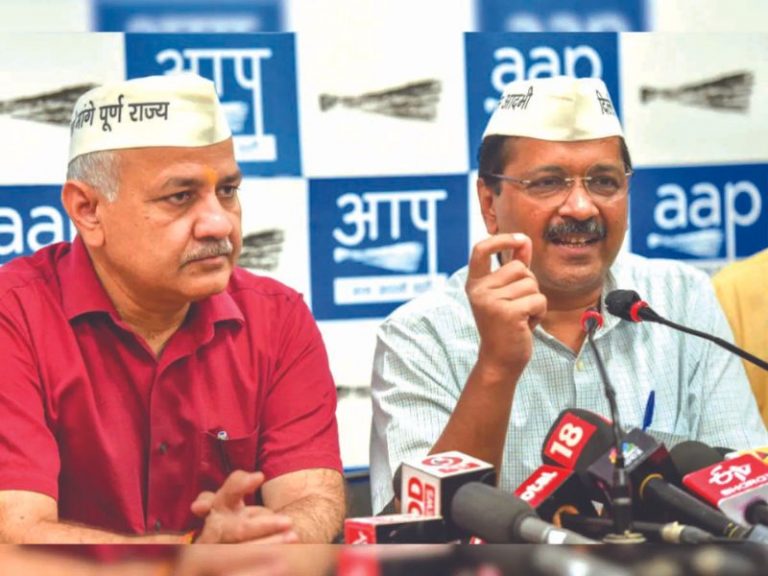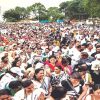Delhi: National footprint gambit
Autar Nehru (Delhi)

Kejriwal (right) & Sisodia:
India’s political class is arguably the most obtuse of any country worldwide. Whereas politicians world over are well aware that education of children is the highest priority of parents, for post-independence India’s politicians and political parties, education of generation next is a peripheral low priority issue. Party manifestos pay mere lip service to the subject and education seldom figures in political debates and discourse.
The leadership of the new genre Aam Aadmi (‘common man’) Party (AAP) is an exception to this rule. Quite clearly, this political party born out of social activist Anna Hazare’s anti-corruption national movement (2012), believes that children’s education is an electoral issue. In 2015, after the BJP spectacularly won General Election 2014, it called a legislative assembly election in Delhi state. Against all expectations, the newly registered AAP won 67 seats in the 70-strong assembly. In 2020, after the BJP won an even larger majority in General Election 2019, campaigning on the platform of improving education and health services and corruption-free government, AAP won 62 seats in the Delhi state assembly.
Arvind Kejriwal, a former civil servant and Manish Sisodia, chief minister and deputy CM respectively of the AAP government of Delhi state, evidently believe that education — especially primary-secondary education — is an elections winning issue. Delhi’s AAP government loudly proclaims that it allocates 20-25 percent of its annual budget expenditure for education, a larger proportion than of any state government countrywide. It has impressively spruced up and modernised state government schools and children’s learning outcomes have improved significantly.
The AAP leadership claims that students are leaving upscale private schools to enroll in state government schools. There’s some evidence to back this claim. The AAP government’s 22 show-piece Rajkiya Pratibha Vikas Vidyalaya (RPVV) schools are highly respected. Five of them are ranked among the country’s Top 10 state government schools in the latest EducationWorld India School Rankings 2022-23 (see. p.160).
The AAP leadership’s electoral promises of upgrading and modernising primary-secondary education combined with improved public health services and anti-corruption drives have impacted electorates beyond Delhi. Last March, AAP won a spectacular victory in the Punjab legislative assembly election winning 92 seats in the 117-strong assembly, and the party’s first government beyond Delhi state was sworn in on March 16.
Now with assembly elections due to be held in Gujarat and Karnataka early next year, the AAP leadership has developed national ambitions. In August, it launched ‘Make India No.1’ campaign. Shortly later, it launched an ambitious Delhi Model Virtual School (DMVS) on August 31. This national online classes IX-XII schooling programme is open to any student countrywide. Admissions began on August 31 and a clear challenge has been thrown to the 43-year-old NIOS (National Institute of Open Schooling, estb.1979).
According to political pundits in Delhi, the DMVS open schooling programme is designed to give AAP a national image in the run-up to General Election 2024. The outcome of the AAP government’s success in delivering online education during the Covid-19 pandemic lockdown, DMVS has been promoted under the aegis of Delhi Schools of Specialised Excellence Society and is affiliated with the Delhi Board of Secondary Education (DBSE). This open schooling programme announced in the state budget of 2021-22, will enable students who can’t afford regular schooling for various reasons including sports commitments, school dropouts, girl children prevented from going to school due to distance, social taboos, child labour and others. “It is an anywhere, anytime futuristic concept whose time has come,” says an AAP spokesperson.
DMVS has divided educationists on its ramifications for high school education. According to Srinivasan Sriram, principal of the high-ranked The Mann School, Delhi, the DMVS initiative is conceptually sound but it has a “lot of loose ends”. “Whether DMVS will address the shortcomings of NIOS, is a question that needs to be answered. Moreover, it is silent about the social and emotional education of children. This is a digital technologies driven project and it’s not clear to what extent teachers have been trained to deliver online lectures effectively,” says Sriram.
With the Gujarat and Karnataka assembly elections round the corner and AAP emerging as a strong contender, its K-12 education-driven campaign will be put to test. If it succeeds, education is certain to move higher up on the national development agenda.

















Add comment